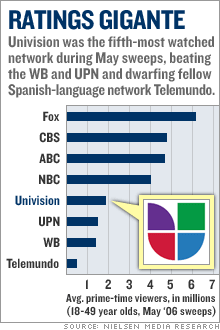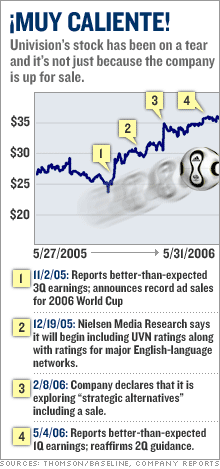|
Mucho dinero for Univision?
Stock Spotlight: Univision shares have taken off since it put itself up for sale, but is there still room for investors to get in?
NEW YORK (CNNMoney.com) - Money. Power. Attraction. Sounds like the stuff Univision's telenovelas are made of. But this is far from fiction for the Spanish-language media company, which owns the most popular television network for U.S. Hispanic audiences as well as 69 radio stations.
After Univision announced that it was for sale in February, Univision (Research) stock has been riding high, climbing almost 15 percent as potential suitors from Disney (Research) to Viacom (Research) have mulled a bid for the company. At the same time, the company has posted healthy first-quarter results and impressive May sweeps ratings. And its World Cup soccer coverage kicks off next week. But with the final bids for the Spanish language broadcaster said to be due next week, some analysts speculate that the stock has already topped out. Gigante operations
Make no mistake, there seems to be little downside to Univision. Univision came in fifth place in prime-time viewership during May, just behind NBC, according to Nielsen ratings. At the same time, the network continues to clobber its nearest Spanish-language rival Telemundo, helped by such programs as Sabado Gigante, which has become the longest-running show in television history. The company also is the top dog in both Spanish radio and Latin music in the United States, while Univision.com is one of the more successful Spanish-language-based Web sites, according to analysts. Exclusive Spanish-language rights to the 2006 World Cup soccer tournament has not hurt either. The company hauled in approximately $180 million in upfront advertising for the World Cup, which kicks off June 9. And while many of its media peers are stuck in a slow-growth phase, analysts say Univision still has a lot of potential. The U.S. Hispanic population, which totals about 40 million, is one of the most rapidly growing demographics and continues to become more affluent, which makes this segment more attractive to advertisers. Analysts expect the company to report earnings per share of $1.07 for 2006, a 20 percent increase from a year ago. For the next few years, analysts are predicting that earnings will increase by about 19 percent a year, on average. Other major media firms are expected to post earnings increases in the low-to-mid teens. So it's no wonder why Univision would be an attractive takeover target. "Everything is working well for them," said David Joyce, media analyst with Miller Tabak & Co. "They have a solid balance sheet and still have long-term positive growth in terms of being in the best position to target the U.S. Hispanic population." Up for sale
But if Univision has everything going for it, then why is the company shopping itself? Analysts say that chairman and CEO A. Jerrold Perenchio, who purchased the firm in 1992 from Hallmark, is eyeing retirement. In addition, strained relations between the company and the Mexican broadcaster Grupo Televisa (Research), which owns almost an 11 percent stake in Univision, have also prompted discussion of a sale, say analysts. "[Perenchio] may want to retire and he may be tired of fighting with Televisa," says Philip Remek, a media analyst at Guzman and Co. But with as much appeal as Univision may have, the popular opinion among analysts seems to be that the big English-language media outfits won't make an offer given the company's hefty price tag. So that narrows the field of bidders to two groups - Grupo Televisa, and Haim Saban, the billionaire media investor who is most well-known for producing the "Mighty Morphin Power Rangers" television series. Both Grupo Televisa and Saban also have private equity firms backing their bids. Most analysts tend to agree that Univision should fetch at least $40 per share in a sale, about 10 percent higher than its current price. And the price could go even higher, according to Marci Ryvicker, a media analyst at Wachovia Securities. "I do see a bidding war," says Ryvicker. "You have a lot of private equity groups that want these assets." Univision worth a look?
So with the company showing signs of continued strength and likely to sell for a premium, picking up some Univision stock should be a no-brainer right? Not so fast. Univision shares are currently trading at nearly 16 times estimated earnings before interest, taxes, depreciation and amortization (EBITDA), the standard by which media outfits tend to be valued. Remek called that a "nose-bleed level," as several other large media companies tend to trade at about 10 to 11 times 2006 EBITDA estimates. And analysts point out that both the buyout offer and revenues from the World Cup are already baked into Univision's shares, leaving potential investors with a stock that might not do much after a deal is finalized. Plus, if Univision has a change of heart and removes the "For Sale" sign, that could cause investors to run for the exits. "The stock would drop out of the sky," says Remek. So if you don't already own shares of Univision, it might not be worth taking a shot on goal with this stock. ___________________ Media stocks ready for their close-up -- click here. To be on TV or not to be on TV -- click here.
None of the analysts quoted in this story own shares of Univision, nor do their firms do not have investment banking relationships with the company. |
|


